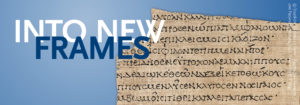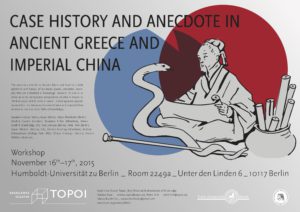The project aims to investigate a certain group of imperial Greek texts known as ‘doxographical texts’ from a literary perspective. The primary aim is to show that doxography is an independent literary form of philosophico-scientific re-writing within the larger context of imperial Greek literature.
Research

International conference co-organised by Marco Blumhofer on the phenomenon of de- and re-contextualisation of motifs, texts and ideas into new literary, cultural and material contexts.
Doxographical writing – literally the writing (γραφή) of philosophical or scientific tenets (δόξαι) – is a specific literary form of reproducing and systematising knowledge that already exists (i.e., that has been articulated by former philosophers or scientists). Forming a fundamental part of any philosophical or scientific activity until today, doxographical texts can be traced back to Aristotle or even the Sophistic movement in the 4th/3rd century BCE; however, all surviving doxographical texts date from the imperial period. For scholars of antiquity doxographical texts always have been of high value as they often preserve, as secondary texts, knowledge which has been lost in its original context. Although recent studies (cf. the works of Mansfeld/Runia) have evaluated these texts more seriously as philosophical or scientific texts in their own right, and despite the huge amount of previous scholarship on single philosophers, texts, topics etc., there has been no comprehensive approach to doxographical writing as a literary phenomenon in the wider context of imperial Greek (and Latin) literature.
Marco Blumhofer’s PhD project investigates a representative selection of extant imperial Greek doxographical writings in order to analyse their specific formal features and to shed light on the literary and cultural contexts these texts belonged to. The methodological focus of his comparative project is both narratology and intertextuality.
Research
In his analyses, Marco is able to show, first, that formal variety and generic ubiquity are two key features of imperial doxographical writing, and second, that these features can be rewardingly approached in terms of literary studies. Seen from a narratological perspective, doxographical texts are ‘stories of knowledge’ as they are not sheer representations of knowledge, but rather complex representations of representations of knowledge. As stories, they show a variety of forms both in their narrative discourse and in their emplotment. A unifying feature, by contrast, is the use of a ‘dramatic mode’ in representing the philosophical or scientific tenets and, correspondingly, their lack of an ‘authorial voice’ or any form of literary self-fashioning in para- and meta-texts. The same formal variety can also be detected in the intertextual structures of imperial doxographical writings. More specific, they build on sources which are not indicated and make use of literary means which conceal or distort their actual interrelations with previous texts. Thereby multi-layered fabrications of knowledge texts arise which cannot simply be regarded as ‘secondary texts’.
Activities

International conference co-organised by Marco Blumhofer
As to the beginning of his third year at Topoi, Marco has been involved in the organisation of three workshops tightly connected to his project and its comparative literary approach. In two international workshops on “Case history and anecdotes in ancient Greece and imperial China” and “Decontextualisation and transmediality in ancient literatures” respectively, doxographical writings were discussed within the context of current research on ancient narratological and intertextual phenomena. Finally, the workshop on “Personal Authority” relocated his project within the theoretical framework of the Topoi research group (B-5) Personal Authorization of Knowledge, which investigates the interrelations between knowledge, authority, and personality.
